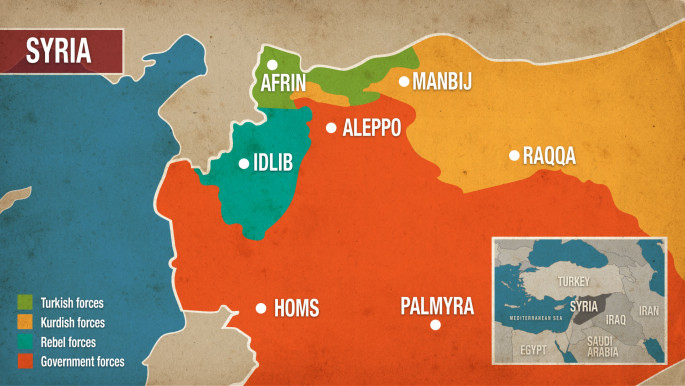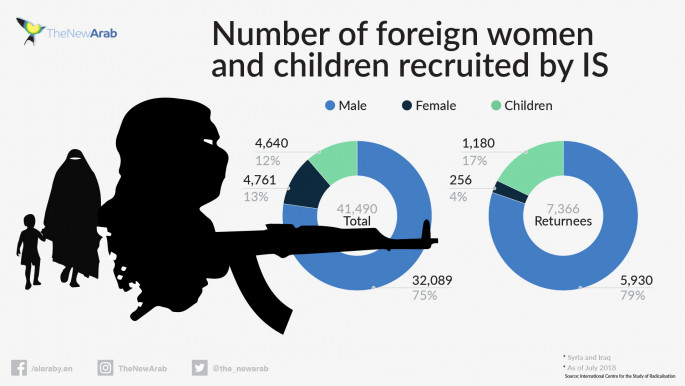What happens next? Turkey launches a new offensive in Syria
President Recep Tayyip Erdogan announced the start of the offensive on Twitter, dubbed "Operation Peace Spring", which will see a Turkish-Syrian rebel force establish a "safe zone" along the border.
The invasion has led to fears a full-blown war could break out between the Kurdish-dominated Syrian Democractic Forces (SDF) and the Turkish-led force, which includes thousands of Syrian rebel fighters.
Moments after the tweet was sent, plumes of smoke rose over the Ras Al-Ain border area, as air strikes hit the Kurdish-run enclave.
What is the current situation?
Twenty-five Turkish jets were involved in the initial phase of the offensive on Wednesday, according to the Kurdish-led Syrian Democratic Forces, striking a total of 16 targets across the wide border area.
At least two civilians have been killed so far in the Turkish bombardment.
The SDF said that Turkey's bombardment has already triggered a wave of displacements from border areas, with motorcycles and vehicles packed with people streaming out of the area.
 |
Why has Turkey launched 'Operation Peace Spring'?
Ankara believes the assault is necessary to curb the power of the SDF due to their ties with Kurdish insurgents inside Turkey.
Turkey says it wants to establish a "safe zone" on the Syrian side of the border where it could send back some of the 3.6 million refugees it hosts from the eight-year civil war.
In President Erdogan's words on Wednesday: "Our mission is to prevent the creation of a terror corridor across our southern border, and to bring peace to the area".
The issue of Turkey's Syrian population was a hotly debated issue in the last Turkish election, while xenophobic attacks on refugees have also taken place.
How have Syria's Kurds reacted?
The Kurds say Ankara's real goal is to dilute their demographic dominance in the northeast in the country, by inviting in thousands of mostly Sunni Arab refugees - from other parts of Syria - who now reside in southwestern Turkey.
Kurdish authorities announced a "general mobilisation", urging all civilians to "head to the border with Turkey... to resist during this delicate historical moment".
Where does US President Donald Trump stand?
President Trump is widely seen as having given a green light for the operation, when he ordered the pullback of US troops from the Turkey-Syrian border - which had served as a buffer - over the weekend.
Comment: Worse than 1975, Trump's cynical betrayal of the Kurds
|
Trump insists the US had not abandoned its Kurdish allies who were a crucial ally in defeating Islamic State group. Many US politicians - including members of the Republican Party - have slammed the move as a betrayal.
Why would President Trump pull out US troops?
Since the collapse of IS last year, Trump has pledged to "bring home" the some 1,000 US troops currently in Syria, despite warnings from some security experts that the group could make a comeback or benefit Russia and Iran.
Just today, Trump tweeted "GOING INTO THE MIDDLE EAST IS THE WORST DECISION EVER MADE IN THE HISTORY OF OUR COUNTRY!", reiterating his strong desire to detach from the region.
What does Turkey have against the Syrian Democratic Forces (SDF)?
Ankara insists the SDF, and its political wing the Syrian Democratic Council, are merely fronts for the Syrian Kurdish People's Protection Units (YPG), allegedly an arm of the outlawed Kurdistan Workers Party (PKK) that has waged an insurgency against Turkey for the past 35 years.
Who is fighting on the Turkish side?
Around 15,000 Syrian rebel fighters, unified under the National Army (NA) umbrella, are expected to take part in the the Turkey-led intervention that aims at capturing the border area.
Is this the first time Turkey has launched a cross border operation?
|
Wednesday's operation is Ankara's third offensive in the war-torn country, preceded by Euphrates Shield and Olive Branch.
What were Euphrates Shield and Olive Branch?
Operation Euphrates Shield - launched in 2016, days after an attack blamed on IS that killed 54 civilians in the Turkish town of Gaziantep - targeted IS and the YPG.
On 24 February 2017, the Turkish army announced it has taken control of the Syrian town of Al-Bab, the final objective of Euphrates Shield and the last IS bastion in Syria's northern Aleppo province.
Olive Branch was a major air and ground operation launched in January 2018 against the YPG in Syria's region of Afrin, about 30 kilometres from the border.
The fighting displaced about half of the Kurdish enclave's 320,000 people, according to the United Nations, while rights groups document abuses after the takeover.
What does this mean for Islamic State group?
While a Kurdish-led operation earlier this year saw the end of IS' territorial caliphate, the organisation is not dead and sleeper cells have been active in several parts of Syria and Iraq.
The Kurds are now warning that a Turkish offensive would reverse the military gains achieved against IS and allow the jihadist group's surviving leaders to come out of hiding.
There is the risk of already understaffed and volatile "IS jails" falling out of SDF control if guards are called up to defend the territories or are forced to retreat from the area.
 |
How has the international community responded?
Russian President Vladimir Putin urged Erdogan to "think carefully" before the offensive, while the European Union demanded Turkey halt its military operation.
The UN Security Council will hold an emergency meeting on Thursday, diplomats announced Wednesday.
How is the situation likely to play out?
The Turkish intervention will be launched in three stages over several months, sources have told The New Arab, and will most likely see scores of Kurdish and Arab towns and villages in northeastern Syria come under direct Turkish control.
Read more: Only peace between Turkey and the PKK can bring stability to northern Syria
What does it mean for civilians on the ground?
Syria has already been through eight years of a bloody civil war, and the latest incursion by Turkey will likely only add to the devastation.
The outcome for civilians could be extremely harrowing, particularly if fierce fighting or bloody Kurdish or IS insurgencies begin, or if the regime take control of territories in Raqqa province.
|
|
Agencies contributed to this report.
Follow us on Twitter: @The_NewArab

![Palestinians mourned the victims of an Israeli strike on Deir al-Balah [Getty]](/sites/default/files/styles/image_684x385/public/2024-11/GettyImages-2182362043.jpg?h=199d8c1f&itok=xSHZFbmc)


![The law could be enforced against teachers without prior notice [Getty]](/sites/default/files/styles/image_684x385/public/2178740715.jpeg?h=a5f2f23a&itok=hnqrCS4x)
 Follow the Middle East's top stories in English at The New Arab on Google News
Follow the Middle East's top stories in English at The New Arab on Google News

![Voters in Michigan [Getty]](/sites/default/files/styles/image_330x185/public/2182490468.jpeg?h=a5f2f23a&itok=XMi_sWGX)
